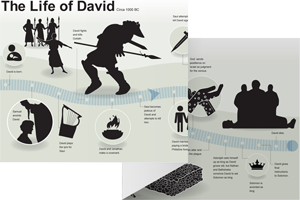19:1–19 This chapter describes another military victory; the parallel account appears in 2 Sam 10:1–19. 1–2 Chronicles skips the story of David’s kindness to Saul’s grandson, Mephibosheth (2 Sam 9:1–13), having stated earlier that Saul’s entire house had died (see 1 Chr 10:6 and note). |
19:1 Nahash the king of the Ammonites Nahash—whose name means “snake” or “serpent”—besieged the Israelite territory of Jabesh Gilead during the reign of Saul. See note on 1 Sam 11:1. The Ammonites were distant relatives of the Israelites (Gen 19:38) and had a history of conflict with them.
The Ammonites |
19:2 his father showed kindness Nahash may have helped David because they both were enemies of Saul (1 Sam 11:1–11). Alternatively, this may refer to a treaty between David and the Ammonites.
19:4 shaved them The Samuel account states that he shaved half their beards—a way of humiliating one’s enemies (2 Sam 10:4).
cut off their garments at the middle Leaving them naked from the hips down. This type of shaming was used for prisoners of war (Isa 20:4).
19:5 Dwell in Jericho See 2 Sam 10:5 and note.
19:6 one thousand talents of silver A talent was about 75 pounds (34 kilograms). While 1,000 talents of silver was a substantial amount, it was also a common payment between countries (see 2 Kgs 15:19 and note).
from Aram-Naharaim, Aram-Maacah, and Zobah These mercenary fighters, from north of Israel, also were David’s vassals (1 Chr 18:3–8).
19:7 encamped before Medeba Located east of the Dead Sea, about 20 miles south of Ammon’s capital. See note on v. 9.
east of the Dead Sea, about 20 miles south of Ammon’s capital. See note on v. 9.
19:8 mighty warriors See 11:10–47.
19:9 at the entrance of the city Most likely the Ammonite capital of Rabbah, located about 24 miles east of the Jordan River at modern-day Amman, Jordan.
19:11 Abishai his brother See note on 2 Sam 2:13.
19:16 the army of Hadadezer David had already defeated Hadadezer once (1 Chron 18:3–8). Hadadezer perhaps wanted to avenge that defeat.
 Battles of Saul and David Table
Battles of Saul and David Table
19:18 seven thousand chariots The Samuel account says 700 chariots (2 Sam 10:18).
19:19 the servants of Hadadezer Probably small city-states.

|
About Faithlife Study BibleFaithlife Study Bible (FSB) is your guide to the ancient world of the Old and New Testaments, with study notes and articles that draw from a wide range of academic research. FSB helps you learn how to think about interpretation methods and issues so that you can gain a deeper understanding of the text. |
| Copyright |
Copyright 2012 Logos Bible Software. |
| Support Info | fsb |
 Loading…
Loading…


 Ammonites
Ammonites